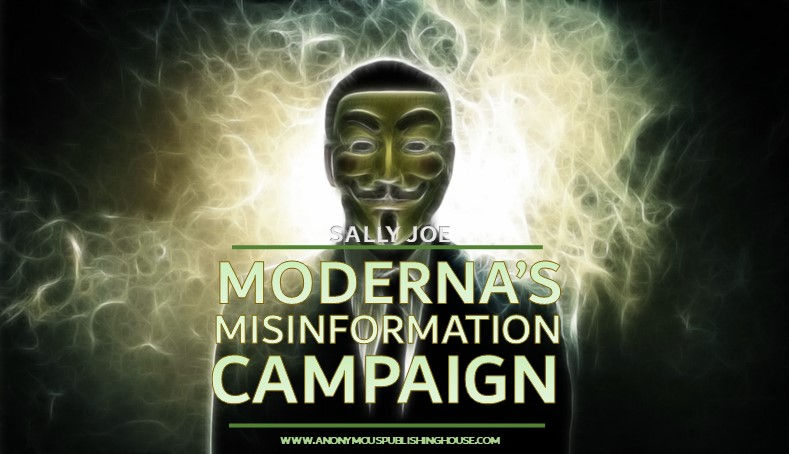Moderna's Misinformation Campaign: Shaping the Vaccine Discourse and Free Speech
- Sally-Joe F

- Nov 21, 2023
- 3 min read
In a world where information flows freely and opinions clash like mighty waves, it's becoming increasingly challenging to discern truth from manipulation. Today, we dive deep into the murky waters of pharmaceutical giants and their efforts to control the narrative surrounding vaccines.

Welcome to a revelation that exposes not only the lengths to which corporations will go to protect their profits but also the threats posed to our fundamental rights of free speech and independent thought. As we uncover the shocking tactics employed by Moderna, a behemoth in the pharmaceutical industry, we must question the blurred lines between public health, corporate interests, and the very essence of democracy itself.
In the midst of Novak Djokovic's triumphant return to the US Open, hailed as the victory of an ageless athlete, Moderna, the pharmaceutical giant, found itself in a quandary. "Djokovic Crowned Anti-vaccine Hero after US Open Win," screamed the headline of an internal report. It continued, "The optics of Djokovic, whose vaccine opposition barred him from competing in the 2022 US Open, returning to and winning the Moderna-sponsored competition bolsters anti-vaccine claims that vaccines — and mandates — are unnecessary."

While Djokovic's success was celebrated as a comeback story, for Moderna, it posed a PR challenge. The report rated news related to Djokovic as "high-risk" and highlighted that "vaccine opponents are celebrating" his victory. But what might seem like a straightforward sports story took on a more complex dimension when examined through the lens of a pharmaceutical company's interests.
Moderna, which had enjoyed immense success during the pandemic, saw its profits wane as vaccine demand diminished. In response, the company launched an elaborate marketing campaign to keep vaccination rates up. However, it also embarked on a mission to influence vaccine policy and actively combat any anti-vax narrative in public discourse.
Behind the scenes, Moderna's marketing arm collaborated with former law enforcement officials and public health experts to shape vaccine policy. This collaboration extended to a drug industry-funded NGO called Public Good Projects (PGP), which worked closely with social media platforms, government agencies, and news outlets to combat vaccine hesitancy and "shut down misinformation."

Moderna's misinformation department, in partnership with PGP, monitored a wide array of mainstream and unconventional media outlets, even online gaming communities. They used artificial intelligence to track discussions worldwide and identified not only vaccine hesitancy but also discussions related to competitors like Pfizer.
Former law enforcement agents, like Nikki Rutman, who spent nearly two decades with the FBI, played pivotal roles in Moderna's global intelligence division. Rutman's involvement reflects a broader trend of collaboration between government agencies and social media platforms to shape content decisions.
Moderna's internal reports, which circulate within the company, include colour-coded warnings about the severity of various anti-vaccine narratives. These alerts not only identify potential risks but also provide recommendations for responses to counteract such narratives.
Prominent figures critical of vaccines, like Elon Musk and Russell Brand, were flagged in these reports. Musk's video criticizing claims of vaccine effectiveness and Brand's statements about pharmaceutical profits were deemed "high-risk" because they were seen as influential voices that could undermine public trust in vaccines.
Notably, these reports did not aim to dispute the claims made by these individuals but automatically categorized them as "misinformation" if they were seen as encouraging vaccine hesitancy. The line between combating misinformation and shaping public narratives began to blur, raising questions about the influence of corporations on public discourse.

Moderna's association with PGP, funded in part by lobbyists representing Pfizer and Moderna, provided the company with access to Twitter data and helped formulate speech policies. This close relationship extended into the law enforcement space, where former law enforcement agents joined the vaccine maker.
As the pandemic ebbs, Moderna continues to intensify its surveillance efforts, closely monitoring policies related to vaccine mandates and tracking elected officials' actions and legislation. The company seeks to influence discussions around vaccine policy and ensure vaccine uptake remains high.

In a world grappling with the intersection of public health, corporate interests, and free speech, the sophistication of fact-checking organizations raises concerns about who controls the narrative and influences public opinion. The blurred line between PR and lobbying in Moderna's efforts to shape vaccine discourse underscores the need for transparency and ethical considerations in such endeavors.
As we navigate this complex landscape, it becomes increasingly crucial to examine how corporations like Moderna shape the conversation around vaccines and public health. The battle against misinformation should not compromise the principles of free speech and independent public discourse, and these concerns deserve our attention and scrutiny.
Trust No Single Source
Trust Your Gut &
Stay Curious
Sally Joe
For media inquiries, please contact:
UK - 020 3404 2295
USA - 0650 278 4440
AUS - 02 9072 9499
Help Support Sally Joe and the rest of our Authors by visiting the store to get your copy of the latest Anonymous Author Novel.









Comments